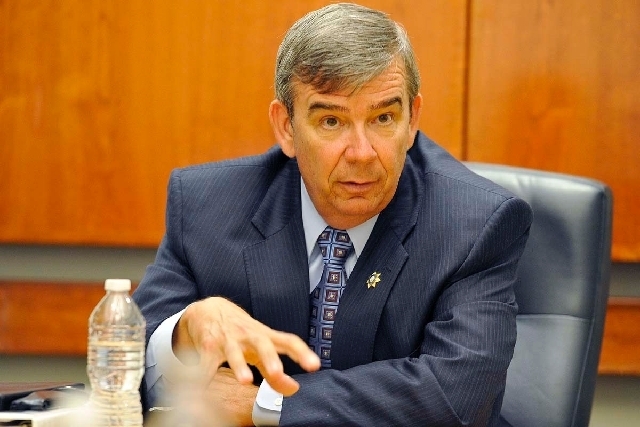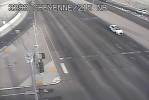Sales tax increase vote looms for county commissioners
Clark County commissioners face a critical decision Tuesday about whether to enact a sales tax increase aimed at propping up the ranks of the Metropolitan Police Department.
The proposed increase, dubbed “More Cops,” would raise the sales tax rate in Clark County by 0.15 percent, with the money going toward the Metropolitan Police Department and other police agencies. Following heavy lobbying by Sheriff Doug Gillespie, the Legislature this year gave the county the authority to make that decision. If approved, the sales tax rate in Clark County would rise to 8.25 percent on Oct. 1.
But even if the tax increase is approved, taxpayers won’t see more officers out in the streets.
Since the recession started, the department has shrunk by 426 officers through attrition.
If the commission rejects the tax increase, the sheriff would have to cut another 250 cops next year to help close a looming $30 million budget shortfall.
If the increase is approved, Gillespie keeps those 250 positions and gets to hire and equip 100 more cops — matching the department’s annual attrition because of retirement or normal turnover.
“The More Cops tax is really not going to give us this great growth opportunity, but it’s going to help us maintain what we have right now,” said Kevin McMahill, deputy chief of the department’s patrol division.
As a result, Clark County commissioners will need to weigh the advantage of a sales tax increase that keeps what’s already in place, or the impact of doing nothing at all.
Opinions vary.
“The impact of this will not put any more officers on the street,” said Commission Chairman Steve Sisolak.
But Commissioner Larry Brown said the downward trend needs to be stopped to prevent higher crime rates.
“My concern is we have to do something or we’re beyond crisis,” Brown said. “We are borderline crisis.”
As for the future, Brown said he is hopeful that, as the economy improves, property and sales tax revenues will increase, putting the department in a better financial position for rebuilding.
McMahill said further reductions would divert the patrol division’s officers away from policing tailored toward preventing crimes and making connections with community members.
Gillespie will need a 5-2 vote to seal the deal. When commissioners approved a resolution in December seeking legislative support, the vote was 5-2, with Sisolak and Commissioner Chris Giunchigliani opposed.
Gillespie has told the Review-Journal’s editorial board that he is confident the commission’s 5-2 vote will be repeated Tuesday. But he acknowledges that it’s not a lock, and said his sales pitch won’t end until the vote.
The sheriff will meet with Commissioner Susan Brager on Monday. Brager was one of the five supporting votes, but Friday said she still has unanswered questions about how the sales tax proposal would factor into pay raises and the number of officers on the streets.
Brager said it’s possible her questions could be satisfactorily answered before Tuesday, but stressed answers are needed before she can support the increase.
Commissioner Mary Beth Scow said she still has questions about the budget and how the revenue would aid the department’s workforce.
“I’m still looking at it,” she said.
If the commission approves the measure, the department would have two 50-cadet academies in 2014 and 2015.
The first is already scheduled to start in February.
New officers will earn a starting salary and benefits package of $71,063 — $48,027 in the salary and $23,036 in benefits, said department spokesman Bill Cassell.
Equipping each new officer costs $3,835.46 for a mix of gadgets and accessories, including a gas mask, handcuffs, duty belt, shotgun, ammunition, manuals, Taser and name tags. Officers buy their own handguns and rifles.
Contact reporter Ben Botkin at bbotkin@reviewjournal.com or 702-405-9781. Follow him on Twitter @BenBotkin1.




























